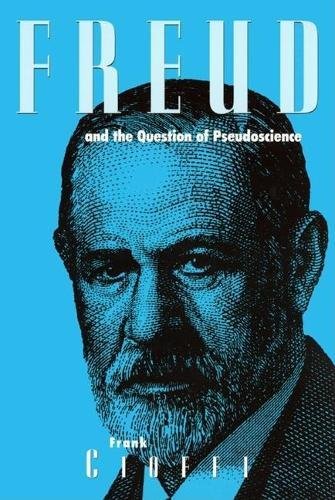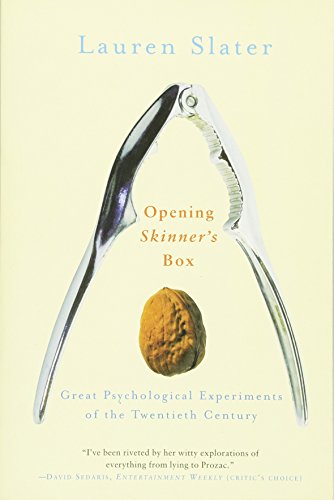(Part 2) Best experimental psychology books according to redditors
We found 78 Reddit comments discussing the best experimental psychology books. We ranked the 31 resulting products by number of redditors who mentioned them. Here are the products ranked 21-40. You can also go back to the previous section.











I think the reason we might assume libido to increase is because we intuitively accept the idea that our behavior is controlled by basic drives (hunger, sex, etc) and that we work to return these levels to some kind of homeostasis. This is essentially what the psychoanalysts argued with their "steam engine" theory of anger (also known as 'catharsis theory'), in that you have to "let off steam" sometimes so that you don't take it out on other people and so you can get it under control.
Turns out, these ideas of behavior aren't very accurate. Drive theory turned out to be a very poor explanation for behavior, and it reached the point where to explain behavior, we had to keep creating new "drives" like "money drives" and "exercise drives" etc. It became unscientific, unparsimonious, and was dropped from science (a good discussion can be found in Mazur's "Learning and Behavior"). This isn't to say that there aren't foundational or basic biological elements which influence, direct, or control certain behaviors, but just that thinking of them in terms of "drives" or us trying to "satisfying urges" doesn't explain behavior very well.
Whilst it may make sense to us on an everyday level to believe that "venting" can relieve an urge to do something, the actual fact is that the opposite occurs. What happens is that standard behavioral laws still apply to our behavior; that is, if the consequence of an action is pleasurable, then we are more likely to repeat it (operant conditioning). So instead of relieving our urges, we actually start to strengthen these associations and make them more likely to occur again in the future. This means that if we're angry and we go beat up a punching bag for 30 minutes, our anger will increase and we will be more likely to snap at people.
The same principle applies to all behaviors, and so it should apply in the case of abstaining from sexual gratification. When you abstain, you are not only reversing the effects of habituation on sensitivity, but you're also putting yourself through a kind of "extinction procedure" where you are decreasing a behavior (in this case the "urge" or "libido") by removing the positive reinforcement that comes along with it.
And then there's the fact that you're breaking a number of behavioral chains and sequences by abstaining - so previously turning on your computer late at night might have led to a certain activity, now all it signifies is that you're browsing reddit or ebay or something. These cues that trigger behaviors are discriminative stimuli, and just like people who try to quit smoking but find it more difficult to resist when they're drinking (because they used to do the two together), you can get the same thing with activities like masturbation. Changing your behaviors can break these behavioral chains, which in part account for the associated feelings of arousal and our libido.
tl;dr: Basic behavioral mechanisms can account (at least in part) for the phenomenon you described - operant conditioning, habituation, extinction, etc.
The short answer is yes, they were huge influence when Zen was first being established in the West:
People quickly realized their limitations. If you want to read an academic book on the subject I recommend Altered States: Buddhism and Psychedelic Spirituality in America by Doug Osto.
Wrong. Wrong. Oh so wrong I don't even know where to begin. Have you read even a single psychology journal article or book?
But lets start with hypothesis testing. Psychologists do experiments which require falsification of hypothesis. Psychologists publish these studies in peer reviewed journals. Psychologists replicate these studies.
Now it's much harder to quantify and study Human behaviours. Particles, atoms, molecules are simple in comparison. Humans are complicated, so it does make it harder to study behaviour and cognition(add to the fact that no one can read any other person's minds which adds a difficulty to objective study of cognition and a use of self-report;admittedly self-report isn't the ideal but it is a useful source of data).
Do not, for fucks sake, conflate psychoanalysis with psychology. Freud was not a psychologist-he trained as a neurologist. He had some novel ideas, which he mostly made up in combination with some clinical observations. But, and I'm saying this again because it bears repeating-Psychoanalysis is NOT psychology.
There are plenty of refined psychological theories out there. I suggest reading http://www.amazon.co.uk/Opening-Skinners-Box-Psychological-Experiments/dp/074756860X which is a basic and readable introduction into the history of psychology and it's experiments.
This may be what you are looking for: Integral Psychology by Ken Wilber
Reasons I Believe In Setianism
Resources:
[1] More against materialism
• Rejection of Materialism
• Wiki
• Why Materialism is Baloney
• Dualism
• Substance Dualism
• Against Materialism
[2-3] More on Platonism
• Mathematics and Physicalism
• Theory of Forms
• Arguments for Forms
• Plato
• Short
• Platonic Polytheism
[4] More on Life-Fields
• Scientific Evidence
• Evidence 2
• Summary
• By Dr. Burr
• Dr. Aquino
[5] More on Egypt
• [Setian Pyramid Texts] (http://orderoftheserpent.org/forum/index.php?topic=35.msg150#msg150)
• Seth God of Confusion
• Images of Set
• Mysteries of Horus and Set
[6] More on Metaphysics
• Self Actualization
• O.S. AMA
• O.S. statement
• Metaphysics
I'd suggest you read Dr. Pepperberg's books on her work with Alex (and other African Greys). The Alex Studies is a summary of her scholarly work and is written for an audience already versed in ethology and animal cognition. Alex and Me covers a lot of the same material, but is definitely written for people with a less scientific interest in the subject.
Alex was certainly a fascinating bird, and even if he was an anomaly among species he opened a window in to the potential that these creatures have.
If you're into Social Psych:
The Lucifier Effect - Philip Zimbardo
Zimbardo decided to write an update on conclusions of the Stanford Prison Experiment in the wake of the Abu Graib scandal.
Politics and Psychoanalysis:
Leaders and Their Followers in a Dangerous World: The Psychology of Political Behavior (Psychoanalysis and Social Theory) - Jerrold M Post
The Mind of the Terrorist: The Psychology of Terrorism from the IRA to al-Qaeda - Jerrold M. Post
Not really a psychoanalysis guy myself but they may be worth a read if you are into geopolitics as well as Psych.
General Psych:
Opening Skinner's Box: Great Psychological Experiments of the Twentieth Century - Lauren Slater
This one may border on the pop side, I'd call it easy reading. It's a narrative that discusses many of the more famous Psych experiments of the 20th century. Definitely a good summer read, Pop or not highly recommended.
So no expertise, and now that you can't argue that we don't know the science you're telling us we lack common sense.
Go read a book and improve yourself. I recommend Kolb's Introduction to Brain and Behaviour, and you can focus on the chapters around neural development if you like.
Author Lauren Slater, in her book "Opening Skinner's Box: Great Psychology Experiments of the Twentieth Century," writes about her experience trying to 'replicate' Rosenhan's experiment (i.e., pretends to have schizophrenic symptoms, gets admitted to a hospital).
Definitely worth the read if you're interested in this experiment!
Apparently they wrote a book about this.
http://www.amazon.com/Freud-Question-Pseudoscience-Frank-Cioffi/dp/081269385X
The Story of Psychology by Morton Hunt perfectly covers history of psychology from Ancient Greeks to German Psychophysicists to Behaviorism to Cognitive Psychology. It's some 600 pages, but very entertaining, easy to read and accurate at the same time.
The Other Side of Psychology by Denise Cummins gives a nice overview of cognitive psychology - memory, learning, emotion etc., plus famous experiments such as those of Milgram. Very interesting read.